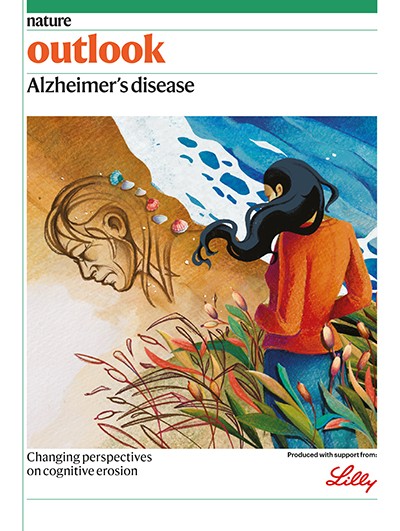You have full access to this article via your institution.

Illustration: Chiara Vercesi
It might be difficult to understand just how tough a diagnosis of Alzheimer’s disease can be for an individual and their family until you have experienced it personally. Sadly, too many of us will come to know the feeling well: there are around seven million new cases of Alzheimer’s every year.
Nature Outlook: Alzheimer’s disease
For a long time, this degenerative condition, in which memory loss and confusion build over a number of years, was viewed as an unstoppable force or even a natural consequence of ageing. Today, we know that neither is true. Although Alzheimer’s is not yet curable, a handful of treatments can slow its progression, and much work is being done to try to further turn the tide.
The first disease-modifying therapies for Alzheimer’s target the peptide amyloid-β, which clumps together in the brain. Clearing these deposits slows cognitive decline. The task now is to achieve stronger effects by building on anti-amyloid therapy or combining it with drugs that target other aspects of the disease.
Another major breakthrough of the past five years is the development of blood tests that can distinguish Alzheimer’s from other forms of dementia. Although such diagnostics look set to become crucial tools for physicians and researchers, there are already concerns over their potential misuse, including by consumers.
Scientists’ understanding of Alzheimer’s continues to grow, and could lead to new avenues for treatment and prevention. A woman from rural Colombia with a rare collection of genetic mutations has inspired one line of attack. And growing evidence suggests that pathogens might play a part in the development and progression of Alzheimer’s. Researchers are also getting to grips with the mechanisms behind the differences in disease progression between the sexes, which could lead to better care for all. However, this work now finds itself under threat in the United States, with some funding cuts ordered by President Donald Trump’s administration. Even the fight against Alzheimer’s disease is not safe from US politics.
We are pleased to acknowledge the financial support of Eli Lilly & Company in producing this Outlook. As always, Nature retains sole responsibility for all editorial content.



